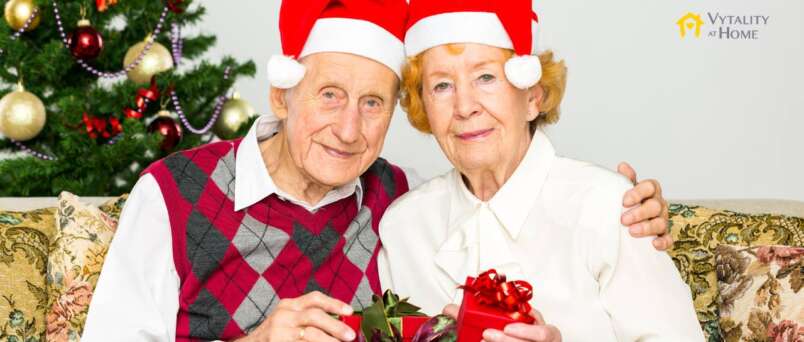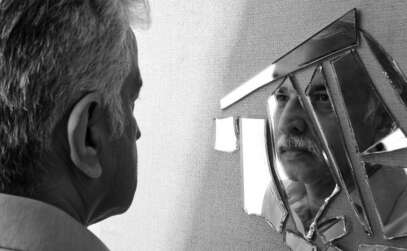Home for Christmas with the folks: four key areas to check they are coping
In the second of our ‘home for Christmas’ series, we look at four key areas to quietly observe when visiting senior parents and relatives.
1. Changes in Personal Hygiene and Appearance
2. Cognitive Changes
3. Changes in Behaviour
4. Balance
Noticing changes in these areas can give you indications of how well senior relatives are coping in their own home, and if they need some extra help to continue to live independently. (For the first blog in the services, see here:)
1. Changes in Personal Hygiene and Appearance
If your relatives have always been smartly dressed and proud of their appearance, it can be quite distressing to see them not looking neat and tidy as before. It’s easy to think immediately that it’s due to cognitive decline, but it may have a more straightforward cause – declining mobility.
Mobility isn’t just about walking either:
- Arthritis in a shoulder may prevent them lifting an arm high enough to brush their hair or shave without pain
- That same arthritis may prevent them being able to move their arms sufficiently to put on tailored or closer-fitting tops or be able to button up shirts.
- They may therefore opt for looser-fitting more casual clothes, which in turn are easier to wash and dry.
- Generally dirty clothes may be due to the inability to wash as many clothes as they did before, due to issues lifting laundry baskets, etc.
Do be aware of any staining that might indicate continence issues, which may in turn have an underlying medical cause. If so, arrange a visit by a physician to check them over, and in the meantime, buy some adult leak-proof padded pants that simply pull on, and can be disposed of in normal refuse.
Personal care is at the core of all our home care services, helping our customers get washed and dressed ready for the day ahead. Contact us now for a consultation with no obligation – we’re here to help.
Behold the bathroom
One of the tell-tale signs of mobility issues is if your parents no longer use their bathtub and only take a shower. Inevitably, ‘stuff’ will get put in the bathtub and it will be clear it has not been used.
This is actually a good sign as it shows that if they used to take baths regularly, they are aware that getting in and out of the bath is now tricky, and the shower is a safer option. (This is often associated with a change in their ability to balance too – see below.)
However, the shower they have may need a few adaptations to make it more easily accessible, such as grab rails, a shower seat, a new non-slip mat inside and perhaps non-slip flooring in the whole bathroom.
The same applies to toileting. Simply by raising the toilet seat level using a ‘over the top’ frame with arms can make a considerable difference to someone with limited mobility and less than perfect balance.
At Vytality at Home, we work with hand-picked Partners who specialize in services for seniors, including bathroom modifications, large or small. Contact us to let us know what your parents might need – we’re happy to help.
Changes in Physical Appearance
Have your parents lost or gained weight recently without any definite cause such as illness? Any major changes in shape may indicate an issue with their diet and exercise.
- Weight gain may indicate a change from a more active lifestyle and healthy eating to a diet that is easier to prepare and less exercise, especially in winter.
- Equally, major weight loss may indicate a growing disinterest in food, or an underlying health condition.
Either way, their doctor and health team should be contacted. This is an issue best passed on to the health professionals to assess.
2. Cognitive Changes
Age does affect the way we think. We may be more forgetful, not as interested in things as we used to be, or just a bit slower to learn new skills especially around technology.
So, you may find your parents ‘zoning out’ some of the more crucial parts of ‘life admin’ because they are simply too much to tackle, especially if they now live alone.
If one person in a couple always paid the bills, did the tax returns, and managed the investments but can’t do that anymore, for example, the other partner may be suddenly responsible for it all.
That might worry them a lot, especially as many financial institutions are moving towards apps and online services, which some seniors will struggle with. Again, this can be at least partly due to physical limitations such as difficulty typing on a phone, tablet, or keyboard, rather than cognitive decline.
Check they are OK with the admin side of life, and if not, get an EPA so you can help when required. You might also introduce a set location where letters and bills are filed after being dealt with, such as a basket or box, so the paper trail is there should you need it.
3. Changes in Behaviour
As we age, our behaviour will inevitably change, as we move from full-time work and activities towards a gentler lifestyle in retirement. However, more substantial changes in behaviour may indicate cognitive decline that will need addressing.
It is worth reading up on the early signs of dementia and Alzheimer’s, so that you know what to look out for. This list from the Alzheimer Society of Canada is excellent.
If you have any concerns, arrange a medical assessment as soon as possible. An early diagnosis can help you and your loved ones make changes to help them live at home with cognitive decline, including home care and live-in care options.
4. Balance
Good balance is something most of us take for granted – until we lose ours. Restricted mobility can affect our balance, as can medical issues such as diabetes and gout. However, there can be other issues that can contribute to feeling ‘unsteady’, including poor foot health.
This may sound a small issue, but painful or swollen legs and feet can drastically affect our natural ability to balance and our gait (how we walk). Foot pain, long toenails, and foot conditions such as bunions and corns may lead to shoes not fitting well, resulting in less contact with the ground and thus affecting balance. In addition, a lack of overall mobility to get out to have feet treated can result in delaying treatment even further
At Vytality at Home, we can arrange a home visit by one of our Partner foot care and podiatry teams to help keep senior feet healthy and well cared for.
Seek medical advice
If your loved ones are having difficulties with mobility and balance, check if they are receiving medical help. If not, make sure they visit their family physician as soon as possible to be checked out and receive the help and support that is available.
Also, think about practical measures to aid walking such as Zimmer frames and wheeled walkers. Consider grab bars in bathrooms, and banisters along corridors inside. Outside, consider access slopes with rails rather than steep steps – remember the route into the house you looked at as part of your arrival! (See blog 1).
Independent living with home care
As we said in our previous article, decreasing mobility or less cognitive ability does not mean the end to independent living or living at home. Homecare is central to any independent living plan, so do reach out after Christmas and put provisions in place with Vytality at Home.
Call us at 403 476 3680 or a free, no obligation home consultation visit, where we can discuss your concerns, and talk through a home care plan tailor-made for your aging parents and relatives. Just contact the office team to discuss; we’re happy to help.




